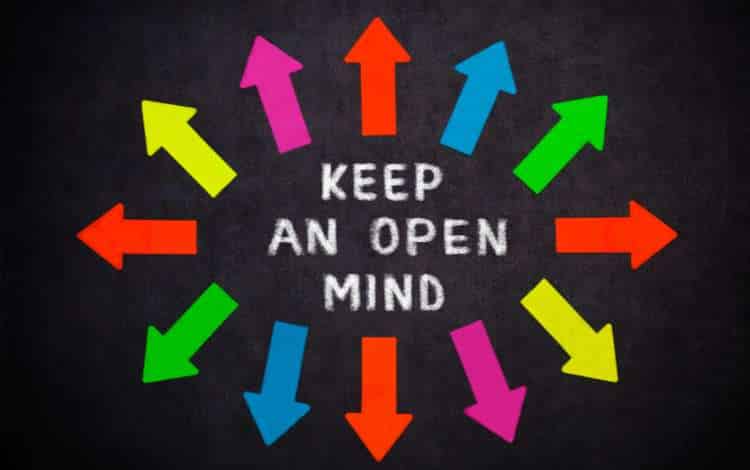
In today’s rapidly evolving world, it is essential to keep an open mind to new ideas. With advancements in technology, an increasingly globalized society, and a constant influx of new information, the ability to adapt and grow is critical.
Open-mindedness allows individuals to embrace change, foster innovation, and create a more inclusive environment.
This article will delve into the importance of open-mindedness, the benefits it brings to various aspects of life, and tips for cultivating an open-minded approach.
The Significance of Open-Mindedness
Browse our online courses on meditation, positive thinking, overcoming procrastination, confidence, and freedom from distractions.
Open-mindedness is the willingness to entertain new thoughts, consider different perspectives, and appreciate diverse opinions.
This mindset promotes intellectual curiosity and fosters personal growth. By being open to new ideas, you can challenge your preconceived notions, break free from cognitive biases, and enhance your understanding of the world.
This kind of mindset means displaying more tolerance toward people and different ideas and beliefs. It also means showing more patience in your interactions with the surrounding world.
Open-Mindedness Fosters Personal Growth
One of the most significant benefits of open-mindedness is personal growth.
When you are willing to entertain new ideas and accept that your beliefs may not be the absolute truth, you create an environment conducive to learning and self-improvement.
By engaging with new perspectives, you can broaden your horizons, develop empathy, and become more well-rounded individual.
Open-Mindedness Encourages Innovation and Creativity
Innovation thrives in environments where open-mindedness is encouraged. The ability to think critically and question the status quo allows you to identify areas in which improvement is needed and generate creative solutions.
This process is essential for businesses, organizations, and societies seeking to stay ahead in an ever-changing world.
A Mindset that Contributes to Building Communities
A key aspect of open-mindedness is the ability to appreciate and value diverse perspectives.
This mindset fosters inclusivity, as you become more willing to listen, learn, and engage with others from different backgrounds and cultures.
In doing so, you contribute to building communities that celebrate diversity, encourage collaboration, and promote understanding.
You will enjoy reading growth mindset quotes.
Being Open-Minded Enhances Problem-solving Skills
Being open to new ideas also has a profound impact on your problem-solving abilities.
Open-minded individuals are more likely to approach problems from multiple angles, consider alternative solutions, and remain adaptable in the face of challenges.
This mindset can enable you to develop effective strategies for overcoming obstacles and navigating complex situations.
Cultivating Open-mindedness: Tips and Techniques
While some people are naturally more open-minded than others, it is a skill that can be developed and nurtured over time.
The following tips and techniques can help individuals cultivate open-mindedness and reap the benefits it brings to their personal and professional lives.
Practice Active Listening
One of the most effective ways to cultivate open-mindedness is to practice active listening.
This involves giving your full attention to the speaker, refraining from interrupting, and asking clarifying questions.
By doing so, you demonstrate respect for the speaker’s perspective and create an environment in which meaningful dialogue can occur.
Related: The Benefits and Advantages of Being a Good Listener
Embrace Uncertainty
Accepting that there is no one-size-fits-all answer to life’s questions is crucial to developing an open-minded mindset.
By embracing uncertainty and the idea that multiple viewpoints can coexist, you begin to appreciate the complexity of the world and the value of diverse opinions.
This also enables you to also develop tolerance, considerateness and patience toward people of diverse cultures and traditions.
Seek Out New Experiences
Expanding your horizons through new experiences can help to broaden your perspective and challenge your preconceived notions.
This may involve traveling, engaging with new cultures, or exploring different fields of study.
By exposing yourself to new ideas, you can develop a greater appreciation for the diversity of human experience and cultivate a more open-minded outlook.
Engage in Constructive Debates
Participating in constructive debates with individuals who hold opposing viewpoints can help to sharpen your critical thinking skills and encourage open-mindedness.
By engaging in respectful dialogue, you can explore different perspectives, challenge your beliefs, and potentially discover new insights.
Remember that the goal of a constructive debate is not to “win,” but rather to learn from one another and enhance your understanding of the topic at hand.
Reflect on Your Biases
Everyone has biases, whether conscious or unconscious. Reflecting on these biases and how they may influence your thoughts and actions is essential for cultivating an open-minded mindset.
By acknowledging your biases, you can take steps to challenge them and be more receptive to new ideas.
Practice Empathy
Developing empathy is a key component of open-mindedness. By putting yourself in someone else’s shoes and attempting to understand their perspective, you can foster a greater appreciation for the diversity of human experience.
This practice not only encourages open-mindedness but also helps to build more inclusive and compassionate communities.
You will enjoy reading: Tolerance Quotes for Becoming More Tolerant.
Cultivate Intellectual Humility
Recognizing the limits of one’s knowledge is essential for maintaining an open-minded mindset.
Cultivating intellectual humility makes you acknowledge that your understanding is not infallible and that you can learn from the insights of others.
With this mindset you keep your mind open to a lifelong learning. It also promotes a greater willingness to engage with new ideas.
More about the Importance of Maintaining an Open Mind
An open mind encourages us to question our own beliefs and values, which can lead to personal growth and development. When we challenge our preconceptions and examine them critically, we are more likely to identify any flaws or inconsistencies in our thinking.
This can lead to a deeper understanding of our own values and beliefs, and potentially allow us to refine or modify them.
Additionally, an open mind helps us to approach challenges and obstacles with a more positive and optimistic mindset.
Instead of being resistant to change or new ideas, we are open to the possibilities that lie ahead. This can lead to new opportunities and experiences, as well as increased creativity and innovation.
Ultimately, maintaining an open mind is essential for personal growth, effective communication, and positive relationships with others.
Open-Mindedness and Emotional Intelligence
Open-mindedness plays a crucial role in developing emotional intelligence, which refers to the ability to recognize, understand, and manage our own emotions as well as those of others.
Emotional intelligence is vital for effective communication, conflict resolution, and relationship-building.
By being open to new ideas and perspectives, you can develop empathy, self-awareness, and social skills, which are key components of emotional intelligence.
This not only helps you navigate interpersonal relationships more effectively, but also contributes to greater emotional resilience and overall well-being.
The Neuroscience of Open-Mindedness
Recent research in neuroscience has shed light on the underlying mechanisms of open-mindedness.
Studies have found that open-minded individuals tend to have increased cognitive flexibility, allowing them to adapt their thinking and behavior more readily to new situations.
Moreover, open-minded individuals have been found to exhibit reduced confirmation bias, the tendency to seek out or interpret information in a way that confirms one’s pre-existing beliefs.
By fostering an open-minded mindset, you can enhance your cognitive flexibility and reduce biases. This would lead to more effective decision-making and improved understanding of each situation that you face.
Open-Mindedness in Leadership
Open-mindedness is also an essential quality for effective leadership. Leaders who are open to new ideas and perspectives are better equipped to navigate uncertainty, adapt to changing circumstances, and embrace innovation.
These kind of leaders are more likely to create a work environment where diverse perspectives are valued, and where employees feel empowered to contribute their ideas.
Furthermore, open-minded leaders are more receptive to feedback, recognizing that constructive criticism can help them grow and improve.
This receptivity to feedback encourages continuous learning and fosters a culture of improvement within the organization.
By modeling open-minded behavior, leaders can inspire their teams to be more open-minded as well, leading to increased creativity, collaboration, and overall success.
You will enjoy reading: Leadership Quotes For Inspiration and Strength.
The Role of Open-Mindedness in Education
Promoting open-mindedness in educational settings is essential for fostering critical thinking, creativity, and problem-solving skills.
It’s important to encourage students to question assumptions, engage with diverse perspectives, and embrace uncertainty.
Incorporating open-mindedness in the curriculum can be achieved by promoting active learning, encouraging constructive debates, and facilitating collaborative projects where students are exposed to different viewpoints.
Moreover, educators can model open-minded behavior by demonstrating a willingness to revise their own beliefs, acknowledging the limits of their knowledge, and valuing diverse perspectives.
Conclusion
In summary, open-mindedness is a crucial skill in today’s rapidly evolving world. By keeping an open mind to new ideas, individuals can foster personal growth, encourage innovation and creativity, build inclusive communities, and enhance their problem-solving skills.
Cultivating open-mindedness requires active listening, embracing uncertainty, seeking out new experiences, engaging in constructive debates, reflecting on biases, practicing empathy, and maintaining intellectual humility.
By nurturing this mindset, you can unlock your full potential and contribute to a brighter future for you and society as a whole.
Browse our online courses on meditation, positive thinking, overcoming procrastination, motivation, confidence, and freedom from distractions.




